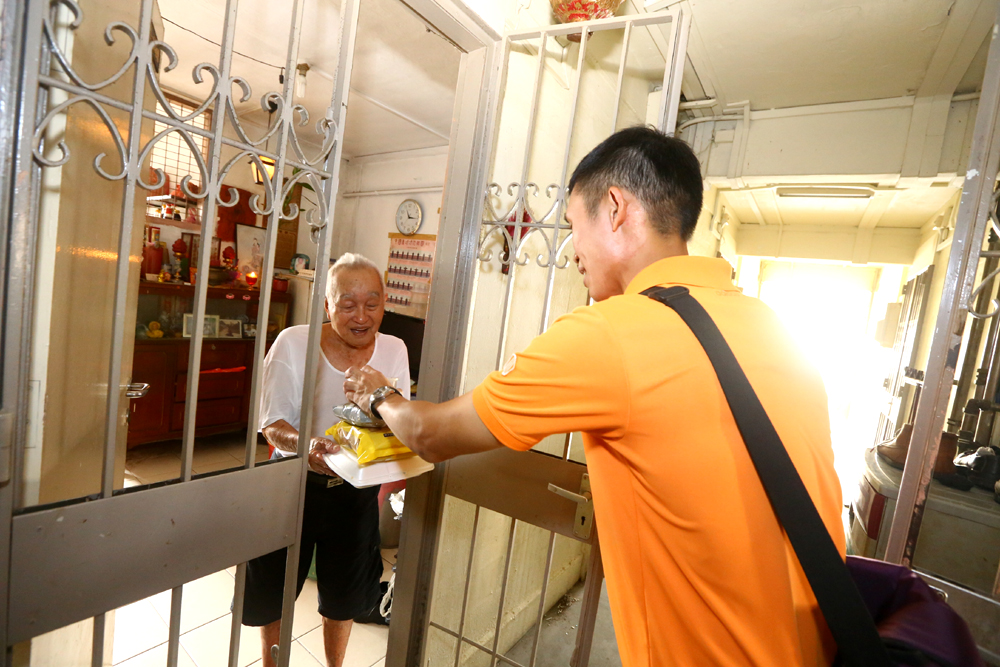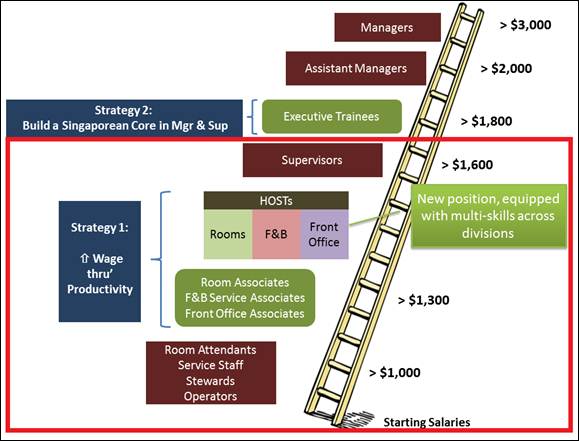My recent participation with A Packet Of Rice distribution has made me see a different side of Singapore society. There are a number of needy elderly folks who has not managed to save enough to provide for their old age. Although our government is actively subsidizing their rented accommodations and has set up social welfare organizations to look after them, the cost of living will only get larger as Singapore population ages.
According to a Ministry of Manpower spokesperson, Singapore has 150,000 Singaporean and Permanent Resident full time employees who are currently earning below the S$1,000-line in 2012. With ever increasing inflation and standards of living, the income gap for these low-wage workers has substantially lagged behind the rest of the nation’s workforce.
If these low wage workers are already struggling to keep afloat, how will they have extra cash to save up for old age? It does not take a genius to see that they will inevitably become needy elderly folks down the road. What can we do to help our fellow low wage Singaporeans such that they are able at least have some spare cash to save for rainy days?
For a long time, there have been calls for minimum wage to raise the wages of the low wage workers, just like what has been implemented in other countries like Hong Kong, UK etc.
For some Singaporeans, the knee jerk reaction will be to follow this global trend and implement a minimum wage. But is minimum wage the best solution for low wage workers? Hong Kong with its close resemblance to Singapore economy offers an interesting case study on the effectiveness of minimal wage.
An article from Time Out Hong Kong shared the impact of minimum wage one year since its implementation in May 2011. Due to the minimum wage law, the median monthly salary of the lowest paid industries saw an 18% raise.
Just when you thought everything looked warm and rosy, it was reported that minimum wage led to greater hardship for employees. Chau, a cleaner, shared that her workload is now heavier because her company has to cut cleaners for each contract so that they are able to meet the minimum wage criteria. With lesser cleaners, she now has to work doubly hard to cover the tasks of the workers who were cut from the contracts. Moreover, cleaners and F&B staff from small restaurants decided to quit and work in security and retail because the latter jobs are easier or provide more welfare.
From what Hong Kong is going through, is minimum wage (despite its attractive short term promises) the way to go for Singapore?
I believe that creating the circumstances for low wage workers to have a better life can be achieved by working on a few fronts simultaneously. We have to ensure that the wage increase is sustainable through a raise in productivity. This idea is one that has been repeated over and over again by Mr Lim Swee Say (see what he means by Cheaper, Better, Faster (CBF) and Easier, Smarter, Safer (ESS)).
Basically, to raise wages, companies need to be more productive, by creating goods and services at a cheaper cost (production / operations / miscellaneous except labour because you want wages to go up right?), better quality and at a faster rate. The idea is to raise profits or cut non-labour costs so the company has a higher profit margin and becomes more competitive than its competitors.
But Mr Lim stressed that this should not be achieved at the expense of workers’ welfare. Workers’ jobs should also be re-designed to become Easier, Smarter, Safer (ESS) – literally! Otherwise what’s the point of getting a pay raise if your job is more difficult?
Although majority of business owners and senior management openly embrace innovation, many shun taking action to change their existing workflow, adopt use of new technology and choose to live by the rules of ‘If it ain’t broke, dont fix it’. Problems are solved “as-they-come-along” using reactive changes in a piecemeal manner. The result is that these types of companies don’t have long term competitiveness and find it difficult to raise wages when they’re just trying to survive the fires of today.
To work around this (besides actively encouraging company management to ditch their comfort zone, innovate and make structural changes), the unions have been providing funding and know-how to support companies brave enough to think and act out of the box.
The big aim of the unions, is to get your boss, to pay you more, to work shorter hours, for an easier job, that’s smarter and safer than your old job, oh and still make customers happy.
You must be thinking, where got so good one?
Holiday Inn Atrium Singapore is one such pioneering example. They paid their staff more (from $1,000 last time to $1,300 now) to work shorter hours. How?
Because staff were cross-trained (in housekeeping, F&B services and front office) to become HOSTs, now bottlenecks in these departments can be solved by a team three times the previous headcount available at any one time, so there was no need to work longer.
How does the job get easier? At Holiday Inn’s Front Office, instead of manually keying in guests’ information, HOSTs just use an integrated magnetic reader system, saving check-in time by 40%.
Customers get benefits too. Don’t you hate it when your card can’t open your room door no matter how many times you swiped? Good news, because Holiday Inn installed a Hi-Co Key Card and Encoder System, guests can receive their keycard in less than half the time needed and experience less card malfunctions.
With cost savings from time saved with less bottlenecks and malfunctions, Holiday Inn staff can do more (such as serving more guests) to raise profits for the hotel. As staff are more productive, Holiday Inn can raise their staff’s wages sustainably by sharing the productivity gains, instead of simply passing the buck to customers.
Sadly such success stories are not as commonplace as they should be.
Recently NTUC’s Progressive Wage Model initiative to raise security guards’ pay in Singapore from $800 to $1,000 has met with resistance from security associations here.
Mr T. Mogan, (President of a security association representing 130 firms) said the higher basic pay (which will also raise overtime pay) will increase overheads, whereas he claims that the cleaning and landscaping sectors do not face this overtime pay issue.
It seems that more concerns are being placed on profitability rather than the welfare of the employees. This is sad and should be frowned upon by society.
What’s the root of the problem? Are employers’ mindsets still stuck in the past where jobs are just a means to an end, where employees are consumables and treated like statistics, where middle managers are torn between the views of the board and that of the workers hence unable to make effective decisions? Or have we simply chosen to outsource social responsibility of low wage workers to the most convenient scapegoat, the government?
The next time you see a low wage worker slogging long hours for low pay doing a backbreaking job, take a few moments to consider if you had in any way contributed to his plight (even indirectly).
I hope you will find it in your heart to help our poor low wage workers attain a better quality of life for themselves and their families.








